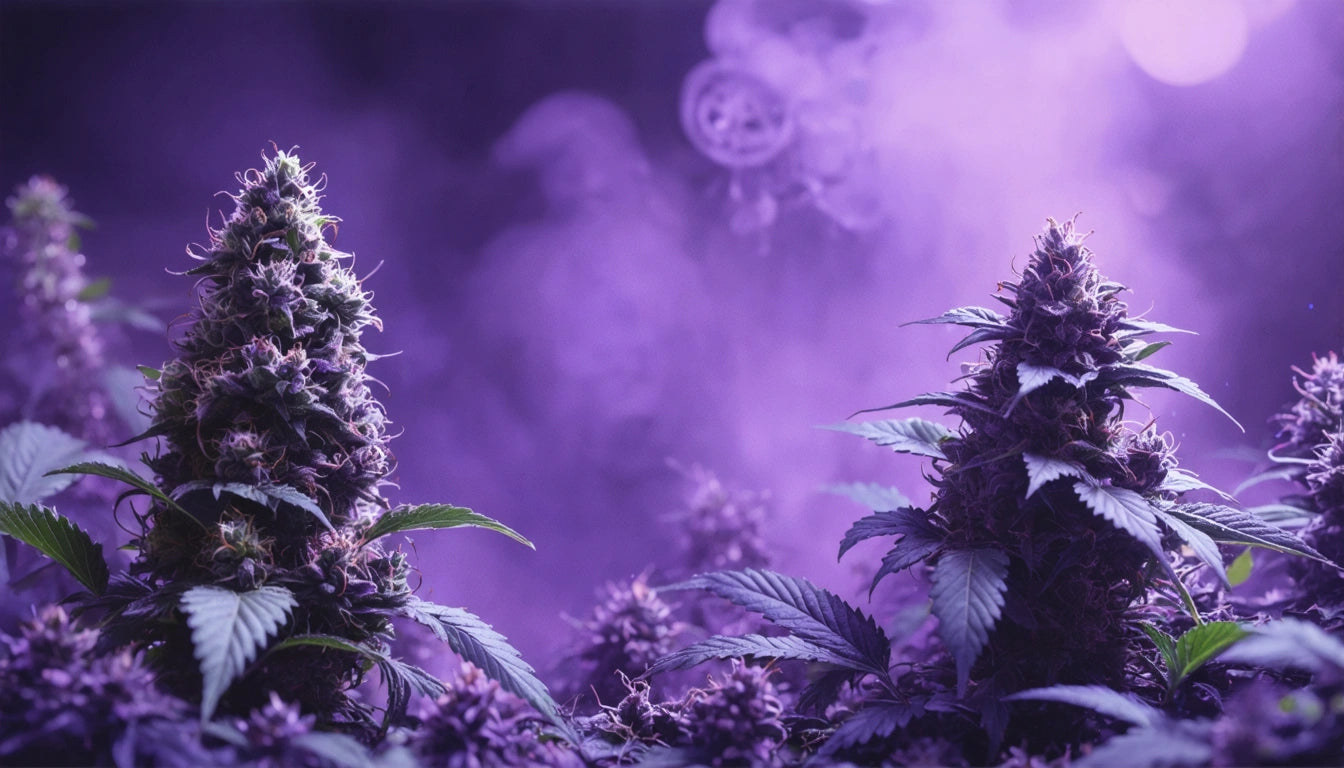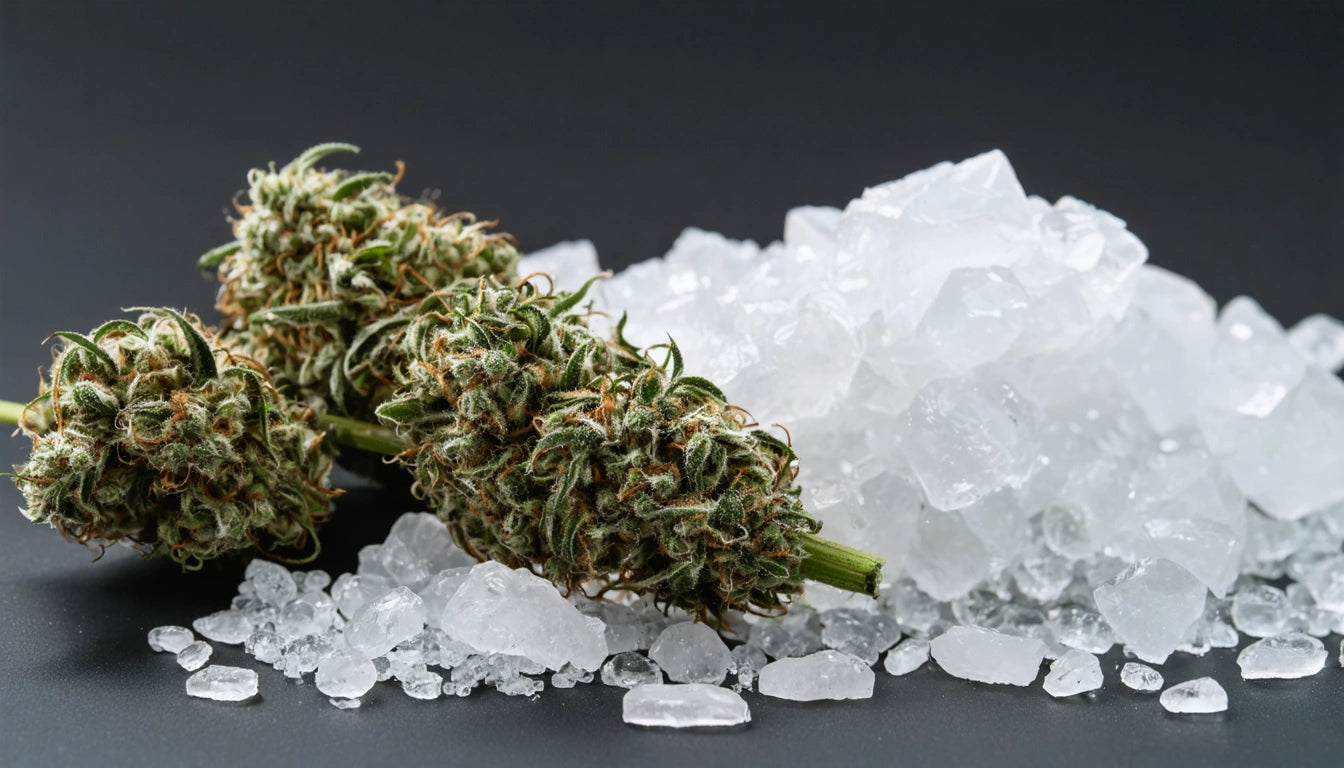Table of Contents
Understanding Purple Cannabis Strains: Indica or Sativa?
Purple cannabis strains have captivated consumers with their striking appearance and unique effects. The vibrant purple hues found in varieties like Purple Punch, Purple Urkle, and Purple Octane often lead to questions about their genetic lineage and classification. Are these purple beauties indica or sativa dominant? The answer requires exploring their genetics, effects, and growing characteristics.
Purple Cannabis: More Than Just Color
Purple coloration in cannabis results primarily from anthocyanins, water-soluble pigments that emerge when plants are exposed to cooler temperatures during the flowering stage. While this purple hue can occur in both indica and sativa varieties, it appears more commonly in indica-dominant strains due to their shorter flowering periods and genetic predisposition.
According to cannabis strain classification guides, the purple color itself doesn't determine whether a strain is indica or sativa. Rather, the plant's morphology, growth patterns, and effects provide the true indicators of its genetic heritage.
Purple Punch Strain: Indica or Sativa?
Purple Punch is predominantly an indica-dominant hybrid, typically featuring an 80/20 indica-to-sativa ratio. This popular strain was created by crossing Larry OG with Granddaddy Purple, inheriting strong indica characteristics from both parent strains.
When consumers ask "is Purple Punch indica or sativa," the answer is clear: Purple Punch leans heavily toward the indica side of the spectrum. Users typically experience:
- Deep physical relaxation
- Stress and anxiety reduction
- Potential sleep aid benefits
- Sweet, berry-like flavor profile
Purple Punch's indica dominance makes it particularly suitable for evening use, similar to other purple strains like Granddaddy Purple, which shares part of its genetic lineage.
Purple Urkle: Deep Indica Roots
When examining whether Purple Urkle is indica or sativa, the evidence points strongly toward indica dominance. As a descendant of Mendocino Purps (or possibly Granddaddy Purple, depending on the specific phenotype), Purple Urkle displays classic indica traits:
This strain typically contains THC levels between 17-20% and produces effects that include:
- Profound body relaxation
- Sedative properties beneficial for insomnia
- Pain and muscle tension relief
- Grape and berry flavor notes
Purple Urkle's growth pattern also confirms its indica heritage, featuring shorter, bushier plants with broader leaves compared to the tall, narrow structure of sativa varieties.
Purple Octane: Examining Its Genetic Profile
Purple Octane strain represents a more balanced hybrid profile compared to other purple varieties, though it still leans indica. This strain results from crossing Purple Punch with an undisclosed strain, inheriting some of Purple Punch's indica characteristics while introducing more balanced effects.
For consumers wondering if Purple Octane is indica or sativa, it's best classified as an indica-leaning hybrid with approximately 60-70% indica genetics. Users typically report:
- Initial cerebral uplift followed by physical relaxation
- Moderate potency suitable for experienced users
- Sweet, fuel-like aroma with grape undertones
- Balanced therapeutic potential for both mind and body
This genetic profile makes Purple Octane more versatile than pure indica purple strains, potentially suitable for both daytime and evening use depending on individual tolerance.
Effects of Purple Strains: What to Expect
While purple strains tend to share some common effects due to their typically indica-dominant nature, each variety offers unique characteristics. Understanding strain origins helps consumers anticipate effects:
Purple Punch effects typically include:
- Deep relaxation and sedation
- Mood elevation without significant mental stimulation
- Potential appetite stimulation
Purple Urkle effects often feature:
- Strong sedative properties
- Pronounced body-focused relief
- Minimal cerebral activity
Purple Octane effects generally provide:
- More balanced mind and body experience
- Moderate euphoria with relaxation
- Less sedation than other purple varieties
For consumers seeking pre-rolled options of these purple strains, high-quality custom cones can enhance the experience by preserving the strain's unique terpene profiles and effects.
Growing Purple Cannabis: Cultivation Insights
The cultivation of purple cannabis strains provides further evidence of their indica-dominant genetics. Most purple varieties, including Purple Punch and Purple Urkle, display:
- Shorter flowering periods (typically 7-9 weeks)
- Compact, bushy growth patterns
- Higher resistance to temperature fluctuations
- Enhanced purple coloration when exposed to cooler nighttime temperatures
These growing characteristics align with typical indica traits rather than the longer flowering, taller structure of sativa varieties.
The Future of Purple Cannabis Varieties
As cannabis breeding continues to evolve, we're seeing new purple strains that challenge traditional indica/sativa classifications. While most purple strains have historically been indica-dominant, breeders are now developing purple sativa and balanced hybrid varieties that maintain the attractive coloration while offering different effect profiles.
Emerging purple strains worth watching include:
- Purple Haze: One of the few purple-tinged sativa-dominant strains
- Purple Thai: A sativa-leaning hybrid with purple potential
- Tropicana Cookies Purple: A balanced hybrid with vibrant purple coloration
These developments suggest that the future of purple cannabis will expand beyond the traditional indica associations, offering consumers a wider range of experiences while maintaining the visual appeal that makes these strains so distinctive.
For those exploring whether Purple Punch is indica or sativa, or investigating other purple varieties, understanding the general indica dominance of these strains provides a helpful starting point. However, individual experiences may vary based on specific phenotypes, growing conditions, and personal physiology.











Leave a comment
All comments are moderated before being published.
This site is protected by hCaptcha and the hCaptcha Privacy Policy and Terms of Service apply.